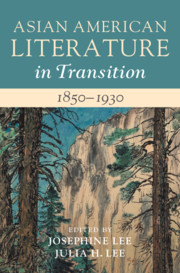Book contents
- Asian American Literature in Transition, 1850–1930
- Asian American Literature in Transition
- Asian American Literature in Transition, 1850–1930
- Copyright page
- Contents
- Illustrations
- Notes on Contributors
- Series Preface
- Introduction: Asian American Literature in Transition, 1850–1930
- Part I Empire and Resistance
- Chapter 1 Reframing Colonial Fantasy and Benevolent Violence
- Chapter 2 Uncollected
- Chapter 3 South Asian American Anti-colonial Writings
- Chapter 4 Challenging Enactments of Power
- Chapter 5 Saum Song Bo on the Statue of Liberty
- Chapter 6 Island in Between
- Part II Bodies at Work and Play
- Part III Crossings
- Bibliography
- Index
Chapter 4 - Challenging Enactments of Power
Remembering the Komagata Maru Incident in Drama and Performance
from Part I - Empire and Resistance
Published online by Cambridge University Press: 27 May 2021
- Asian American Literature in Transition, 1850–1930
- Asian American Literature in Transition
- Asian American Literature in Transition, 1850–1930
- Copyright page
- Contents
- Illustrations
- Notes on Contributors
- Series Preface
- Introduction: Asian American Literature in Transition, 1850–1930
- Part I Empire and Resistance
- Chapter 1 Reframing Colonial Fantasy and Benevolent Violence
- Chapter 2 Uncollected
- Chapter 3 South Asian American Anti-colonial Writings
- Chapter 4 Challenging Enactments of Power
- Chapter 5 Saum Song Bo on the Statue of Liberty
- Chapter 6 Island in Between
- Part II Bodies at Work and Play
- Part III Crossings
- Bibliography
- Index
Summary
In 2017, Canada’s Stratford Festival dramatized The Komagata Maru Incident, Sharon Pollock’s play about Canada’s insistence on returning the ship Komagata Maru (KGM) and its passengers to India after it arrived in Vancouver in 1914. This chapter analyzes Pollock’s and Ajmer Rode’s plays about the KGM to examine, within a comparative framework, their differentiated investments in remembering this landmark moment in Canadian history. While Pollock’s play revisits the KGM to critique Canada’s treatment of its minorities, Rode’s play foregrounds the incident to comment on Canadian law in relation to British imperial interests in India, and the historical and ongoing regulation of national borders. Thus, while both plays challenge the official version of the KGM, Rode’s play situates the incident within a broader global history of empire as opposed to Pollock’s national focus on immigration and social exclusion. Nevertheless, by remembering the KGM from the space of time and distance, both plays provide frameworks for investigating colonial policies and attitudes, and for understanding the critical significance of Gurdit Singh’s first-hand account in Voyage of Komagata Maru or India’s Slavery Abroad. By refusing to forget the compelling story of the Komagata Maru journey, the plays function as powerful sites of historical commemoration.
Keywords
- Type
- Chapter
- Information
- Asian American Literature in Transition, 1850–1930 , pp. 70 - 87Publisher: Cambridge University PressPrint publication year: 2021

